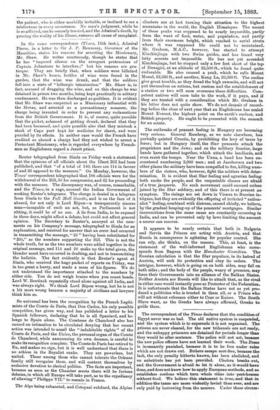In the same correspondence (Times, 11th inst.), Admiral Pierre, in
a letter to Sir J. P. Hennessy, Governor of the Mauritius, states his reasons for arresting the Missionary, Mr. Shaw. He writes courteously, though he states that he has "imposed silence on the arrogant pretensions of Captain Johnstone to interfere ;" but his reasons are gro- tesque. They are briefly that, when soldiers were billetted in Mr. Shaw's house, bottles of wine were found in the garden, that the wine was drunk, and that the soldiers fell into a state of "lethargic intoxication." Mr. Shaw is, in fact, accused of drugging the wine, and on this charge he was detained in prison two months, being kept practically in solitary confinement. He was then discharged as guiltless. It is evident that Mr. Shaw was suspected as a Missionary influential with the Hovas, and arrested as a precautionary measure, the charge being invented in order to prevent any reclamations from the British Government. It is, of course, quite possible that the picket, ashamed of getting drunk, declared that they had been hocussed, and quite possible also that they mistook a stock of Cape port kept for medicine for claret, and were puzzled by its effects. In neither case would the French have credited so absurd a charge had they not wished to arrest a Protestant Missionary, who is regarded everywhere by French- men as Englishmen regard a Jesuit priest.


































 Previous page
Previous page